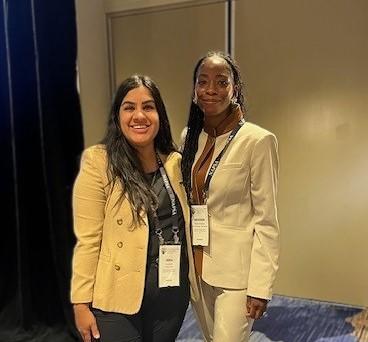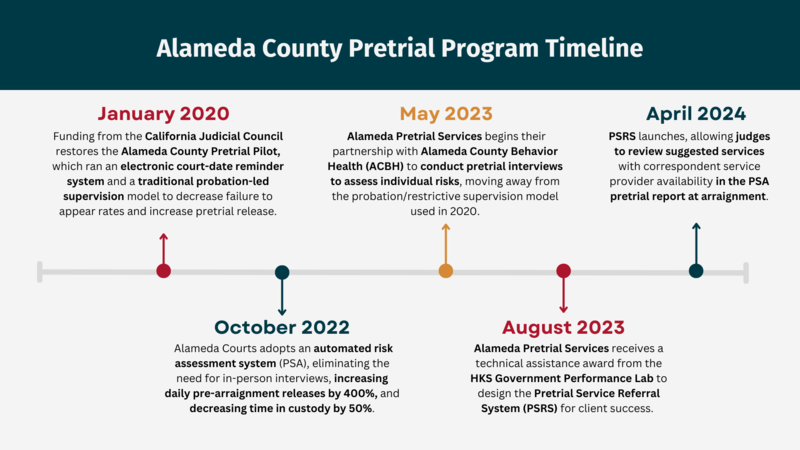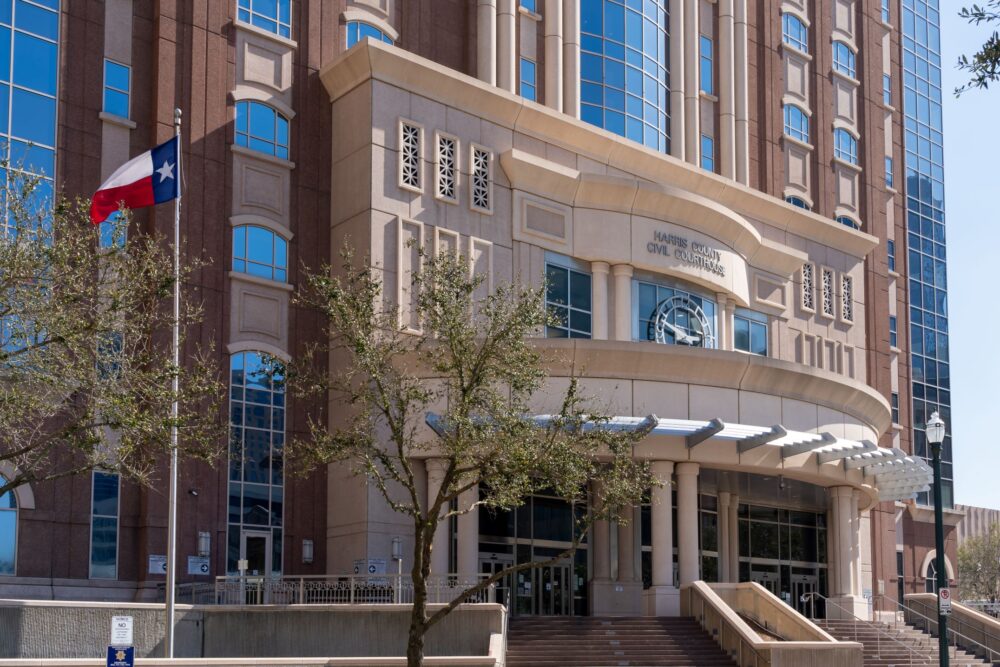
GPL Presents on the Use of Service Referrals During Pretrial Release in Alameda County, California

In September, Harvard Kennedy School Government Performance Lab (GPL) Project Leader Hena Rafiq and GPL Government Innovation Fellow Natosha Dobbins presented key takeaways from the implementation of the Pretrial Service Referral System (PSRS) pilot in the Alameda County Superior Court system, for which the GPL provided technical assistance, at the National Association of Pretrial Services Agencies (NAPSA) conference in New Orleans. They spoke alongside Cory Jacobs, a Pretrial Services Program Manager in Alameda County, California. During their presentation, they focused on three questions:
- How might Alameda’s approach to service referrals improve pretrial outcomes?
- How does the pilot differ from Alameda’s previous pretrial practices?
- What can other jurisdictions learn from Alameda’s pilot?

The Alameda County PSRS pilot aims to improve the likelihood of pretrial release, decrease excessive time spent in jail, and help pretrial clients avoid further involvement with the criminal justice system. The program is testing how to address the unmet behavioral health and social needs of participants by connecting them to supportive services, such as substance use treatment and affordable housing, more effectively.
For example, a pretrial client may be mandated to participate in inpatient behavioral health services in order to be released from jail while awaiting trial. Before the pilot, they may not have had a way to find an available service provider and therefore would have remained in jail. But with the pilot, individual risk assessments allow Alameda Pretrial to identify client needs during booking, match needs to services, and make recommendations during arraignment that ensure the pretrial client is connected to the provider.

Over the past five years, judges and other pretrial stakeholders in Alameda County have initiated a series of pretrial justice reforms designed to reduce the population of pretrial clients held in jail while awaiting trial and mitigate factors that lead to recidivism.

During their presentation at NAPSA, Natosha and Cory shared details on how the pilot tests whether a more expansive service referral program may help Alameda County’s pretrial population exit and stay out of the criminal justice system. They highlighted pilot components including:
- Offering referrals to every person awaiting trial, regardless of risk level.
- Increasing judges’ understandings of individual pretrial clients’ needs.
- Redesigning courts to be human-centered by reducing the burden on criminal justice-impacted individuals to navigate systems where they’ve experienced repetitive harm.
- Addressing underlying needs that contribute to new arrests and failures to appear (i.e., transportation) that can lead to pretrial clients being sent back to jail.
- Helping people establish and maintain connections to community-based supportive services.
- Creating direct pathways to connect pretrial clients with higher needs to collaborative/treatment court programs that provide case management and diversion opportunities.
- Ensuring all pretrial clients have access to information about available resources and supports (rather than relying on pre-existing support networks for information, such as family).
Natosha and Cory noted that these changes are being tested to see if they can contribute to more people on pretrial release receiving the support they need to show up for their court appearances and remain arrest-free while awaiting trial. While this model is still in the pilot phase in Alameda County, other jurisdictions with community-based pretrial models, such as San Francisco, have reported promising results.
Their presentation concluded with plans previewing how the GPL will leverage Alameda County’s data to evaluate and adjust the program in real time using metrics such as time to release, new arrest rates, and service enrollment rates to improve the program’s impact on clients, service connections, and pretrial release outcomes.
The GPL continues to deliver technical assistance to Alameda County Superior Court as it proceeds with the second phase of the pilot: implementing a more intensive court case management model.
Each year, the GPL offers a select number of jurisdictions technical assistance on pretrial reform, including assessing supervision structures to identify opportunities to right-size the intensity and cost of supervision; creating client connections to voluntary supportive services to address underlying needs out of the criminal justice system; and developing training and tools to expose pretrial system stakeholders to innovative approaches in release and supervision. Please visit here for more information about the GPL’s Pretrial Initiative.
More Research & Insights


Building a Responsive Pretrial Supervision System in Harris County, Texas

Bottlenecks, Backlogs, and Breakdowns: Using Data to Identify Gaps in Service Referrals

Measuring Pretrial Success: Two Scenarios for Agencies and Courts

Building a Responsive Pretrial Supervision System in Harris County, Texas
